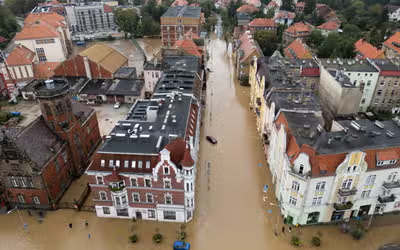At least six people, including four firefighters, have died as wildfires continue to rage across northern Portugal.
More than 5,000 firefighters are battling to control over 100 blazes, with dry conditions and high temperatures exacerbating the crisis.
Among the dead are three firefighters whose vehicle was engulfed by flames, according to Civil Protection official André Fernandes.
Two civilians have also died, one from burns and another from cardiac arrest. One more firefighter passed away due to illness while on duty over the weekend.
As fires stretch across the country, the number of residents forced to evacuate and the extent of the damage remain unclear.
Over 50 people have been injured, and authorities have extended a fire alert until Thursday due to ongoing dangerous conditions.
Prime Minister Luís Montenegro warned that more challenges lie ahead.
"I would like to say within a word of calm and tranquillity we also need to be realistic," Portuguese Prime Minister Luís Montenegro said late on Monday. "We will endure difficult hours in the coming days. We need to prepare for it and we need to come together for it."
One of the worst-affected areas sits in the Aveiro district, south of Porto.
Flames have engulfed homes, leaving entire towns scorched.
In Castro de Aire, smoke billowed over burned terrain as residents tried to save their homes using buckets of water and tree branches.
Firefighting teams have received additional support from water-dropping aircraft, and the European Union has dispatched eight more planes from Spain, France, Italy, and Greece to bolster local efforts.
European Commission President Ursula von der Leyen expressed solidarity with Portugal, calling the quick response by EU nations "EU solidarity at its best."
In Portugal, wildfires have become a recurring threat, with the country experiencing an annual average of over 21,000 wildfires between 2008 and 2020, according to Portugal's Institute for Nature Conservation and Forests (ICNF).
The wildfires come at a time when large parts of Europe are also dealing with extreme weather conditions.
While central Europe has been hit by heavy rainfall and flooding, Portugal remains gripped by scorching temperatures and dry winds.
In 2017, more than 120 people died after four wildfires broke out simultaneously in Pedrógão Grande. Over half a million hectares of land were destroyed.
During a particular peak in 2022, more than 58% of Portugal was experiencing severe drought conditions in 2022, according to the European Drought Observatory.
With no rain expected in the coming days, the risk of further outbreaks remains high.
Following those events, the government implemented reforms aimed at improving the country's response to fires.
But despite these measures, the underlying causes, including drought and poorly managed forests, remain significant challenges.
To reduce the risk of further fires, authorities have banned farmers from using heavy machinery during the fire alert, which has now been extended through Thursday.
The risk of machinery sparking new fires remains a concern.
This article includes reporting from The Associated Press
Disclaimer: The copyright of this article belongs to the original author. Reposting this article is solely for the purpose of information dissemination and does not constitute any investment advice. If there is any infringement, please contact us immediately. We will make corrections or deletions as necessary. Thank you.



